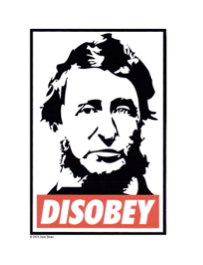Sign up for FlowVella
Sign up with FacebookAlready have an account? Sign in now
By registering you are agreeing to our
Terms of Service
Loading Flow


Civil Disobediance
Thoreau had some serious problems with the way the United States was run.
He was an outspoken opponent of slavery and bitterly opposed the Mexican-American War, which he viewed as an act of American aggression.
Thoreau refused to pay his poll taxes.
He spent a night in jail for this offense in 1848, and was released the next morning when a friend (against his wishes) paid the tax for him.
The following year his essay on the topic, "Civil Disobedience," was published.
Thoreau was not an anarchist; he did not believe that there should be no government, only a more just one than currently existed.
If the government would not improve itself, he argued, it was a just man's duty to refuse to support it.
"It is not a man's duty, as a matter of course, to devote himself to the eradication of any, even the most enormous wrong,"
Thoreau wrote, "but it is his duty, at least, to wash his hands of it, and, if he gives it no thought longer, not to give it practically his support."
Thoreau continued to oppose slavery, and unjust laws.
He hid escaping slaves in his Concord home in defiance of the Fugitive Slave Act of 1850, which made it a crime to help slaves fleeing from slavery.
"Civil Disobedience" has become a manifesto of non-violent protest, read and used by Gandhi and Martin Luther King, Jr.
